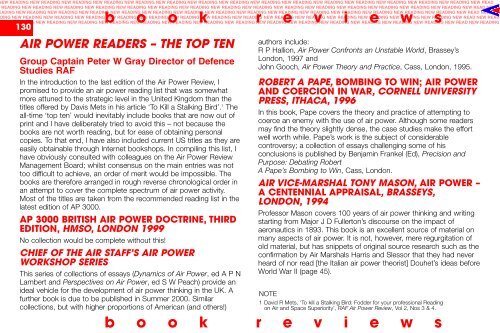THE RAF AIR POWER REVIEW - Royal Air Force Centre for Air ...
THE RAF AIR POWER REVIEW - Royal Air Force Centre for Air ...
THE RAF AIR POWER REVIEW - Royal Air Force Centre for Air ...
You also want an ePaper? Increase the reach of your titles
YUMPU automatically turns print PDFs into web optimized ePapers that Google loves.
EW READING NEW READING NEW READING NEW READING NEW READING NEW READING NEW READING NEW READING NEW READING NEW READING NEW READING NEW READING NEW READING NEW READING NEW READING NEW READ<br />
READING NEW READING NEW READING NEW READING NEW READING NEW READING NEW READING NEW READING NEW READING NEW READING NEW READING NEW READING NEW READING NEW READING NEW READING NEW READ NEW<br />
ADING NEW READING NEW READING NEW READING NEW READING NEW READING NEW READING NEW READING NEW READING NEW READING NEW READING NEW READING NEW READING NEW READING NEW READING NEW READ NEW RE<br />
DING NEW READING NEW READING NEW READING NEW READING NEW READING NEW READING NEW READING NEW READING NEW READING NEW READING NEW READING NEW READING NEW READING NEW READING NEW READ NEW READ<br />
NEW READING NEW READING NEW READING NEW READING NEW READING NEW READING NEW READING NEW READING NEW READING NEW READING NEW READING NEW READING NEW READING NEW READING NEW READ NEW READING<br />
130<br />
b o o k r e v i e w s<br />
<strong>AIR</strong> <strong>POWER</strong> READERS – <strong>THE</strong> TOP TEN<br />
Group Captain Peter W Gray Director of Defence<br />
Studies <strong>RAF</strong><br />
In the introduction to the last edition of the <strong>Air</strong> Power Review, I<br />
promised to provide an air power reading list that was somewhat<br />
more attuned to the strategic level in the United Kingdom than the<br />
titles offered by Davis Mets in his article ‘To Kill a Stalking Bird’. 1 The<br />
all-time ‘top ten’ would inevitably include books that are now out of<br />
print and I have deliberately tried to avoid this – not because the<br />
books are not worth reading, but <strong>for</strong> ease of obtaining personal<br />
copies. To that end, I have also included current US titles as they are<br />
easily obtainable through Internet bookshops. In compiling this list, I<br />
have obviously consulted with colleagues on the <strong>Air</strong> Power Review<br />
Management Board; whilst consensus on the main entries was not<br />
too difficult to achieve, an order of merit would be impossible. The<br />
books are there<strong>for</strong>e arranged in rough reverse chronological order in<br />
an attempt to cover the complete spectrum of air power activity.<br />
Most of the titles are taken from the recommended reading list in the<br />
latest edition of AP 3000.<br />
AP 3000 BRITISH <strong>AIR</strong> <strong>POWER</strong> DOCTRINE, THIRD<br />
EDITION, HMSO, LONDON 1999<br />
No collection would be complete without this!<br />
CHIEF OF <strong>THE</strong> <strong>AIR</strong> STAFF’S <strong>AIR</strong> <strong>POWER</strong><br />
WORKSHOP SERIES<br />
This series of collections of essays (Dynamics of <strong>Air</strong> Power, ed A P N<br />
Lambert and Perspectives on <strong>Air</strong> Power, ed S W Peach) provide an<br />
ideal vehicle <strong>for</strong> the development of air power thinking in the UK. A<br />
further book is due to be published in Summer 2000. Similar<br />
collections, but with higher proportions of American (and others!)<br />
authors include:<br />
R P Hallion, <strong>Air</strong> Power Confronts an Unstable World, Brassey’s<br />
London, 1997 and<br />
John Gooch, <strong>Air</strong> Power Theory and Practice, Cass, London, 1995.<br />
ROBERT A PAPE, BOMBING TO WIN; <strong>AIR</strong> <strong>POWER</strong><br />
AND COERCION IN WAR, CORNELL UNIVERSITY<br />
PRESS, ITHACA, 1996<br />
In this book, Pape covers the theory and practice of attempting to<br />
coerce an enemy with the use of air power. Although some readers<br />
may find the theory slightly dense, the case studies make the ef<strong>for</strong>t<br />
well worth while. Pape’s work is the subject of considerable<br />
controversy; a collection of essays challenging some of his<br />
conclusions is published by Benjamin Frankel (Ed), Precision and<br />
Purpose: Debating Robert<br />
A Pape’s Bombing to Win, Cass, London.<br />
<strong>AIR</strong> VICE-MARSHAL TONY MASON, <strong>AIR</strong> <strong>POWER</strong> –<br />
A CENTENNIAL APPRAISAL, BRASSEYS,<br />
LONDON, 1994<br />
Professor Mason covers 100 years of air power thinking and writing<br />
starting from Major J D Fullerton’s discourse on the impact of<br />
aeronautics in 1893. This book is an excellent source of material on<br />
many aspects of air power. It is not, however, mere regurgitation of<br />
old material, but has snippets of original source research such as the<br />
confirmation by <strong>Air</strong> Marshals Harris and Slessor that they had never<br />
heard of nor read [the Italian air power theorist] Douhet’s ideas be<strong>for</strong>e<br />
World War II (page 45).<br />
NOTE<br />
1 David R Mets, ‘To kill a Stalking Bird: Fodder <strong>for</strong> your professional Reading<br />
on <strong>Air</strong> and Space Superiority’, <strong>RAF</strong> <strong>Air</strong> Power Review, Vol 2, Nos 3 & 4.<br />
b o o k r e v i e w s

















